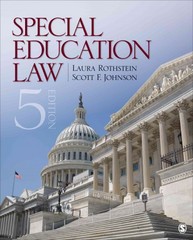Megan is 16. A private psychiatrist has diagnosed her as emotionally disturbed. When Megan enters high school,
Question:
Megan is 16. A private psychiatrist has diagnosed her as emotionally disturbed. When Megan enters high school, the school recommends that she be placed in an in-school placement that the parents believe to be inappropriate. They think Megan needs a highly intensive program that integrates educational programming and counseling.
Because of their concern about Megan’s education and the time it will take to resolve the dispute over the placement, they put Megan into a private residential program
(School A), where she receives programming year-round. The program costs $80,000 per year, which the parents pay. Two years after the parents’ unilateral placement, the final judicial decision finds that the school’s recommended placement is not appropriate and that the program in which Megan has been placed by her parents is appropriate.
During the judicial proceedings, the school presented evidence that although it was not the program recommended by the school, there was another appropriate residential program (School B) available at the time of Megan’s initial placement in School A. The cost of the program at School B is $30,000 per year.
a. If the court were to find that School B is an appropriate placement and that there was space in the program for Megan, how much, if anything, should the school be required to reimburse the parents?
b. Suppose both School A and School B were appropriate placements and that School B had been offered at the time the parents placed Megan in School A. Should the school have to reimburse the parents at least $30,000 for each year, since it would have had to pay that anyway?
c. Suppose that instead of refusing to pay the $80,000, the school agrees to pay the yearly costs pending resolution of the case but contests its obligation to do so. Are the parents required to reimburse the school if it is later determined that the school’s program was appropriate?
d. If it is determined that a student has been provided an inappropriate program for two years, should any compensatory education order be limited to two years? What if the inappropriate programming occurred in primary grades or in preschool, where lost time is difficult to compensate because of the importance of that developmental stage?
Step by Step Answer:

Special Education Law
ISBN: 9781483308319
5th Edition
Authors: Laura F Rothstein, Lauren Berger, Scott F Johnson





